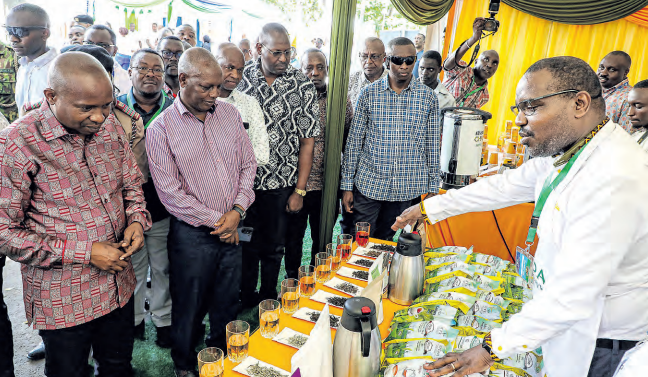

Kenya’s tea sector has marked a milestone in as the Kenya Tea Board hosted a centennial celebration marking 100 years since tea was first commercialised. The Tea Summit last week in Mombasa at the Sarova Whitesands Hotel brought together more than 1,000 tea sector delegates from around the globe.
Despite challenges, Kenyan tea remains one the world’s most sought-after teas, as the country struggles to make its chai, known for its aromatic nature, available in every world capital.
This goal has triggered a change of focus. The State Department for Agriculture is redesigning the marketing approach. It now will feature an annual state-funded tea marketing mission, globetrotting to fi nd markets for the fancied Kenyan teas.
A tremendous 2023 growth in export sales registered Sh180 billion last year and the expected increase by 16 per cent this year could greatly help in resolving challenges that stalked the tea auction market a few months ago.
A crisis of unsold tea at the Mombasa Tea Auction was reported in March, affecting 236.9 million kilos as buyers balked at high reserve prices and quality concerns.
What’s the quality issue? Rotting unsold tea? The convention delved into on how to address challenges bedeviling the sector, including marketing, quality, value-addition, branding and governance.
And, indeed, there is space for Kenyan tea to further penetrate the global market if government can resolve recently reported quality concerns.
The State Department of Agriculture must step up to support smallholder farmers and their factories as they are largest cohort of tea farming groups.
They need to turn to modern technology in tea processing to enhance quality. Partnerships with financiers will enable small factories to purchase the required modern machinery propelling them to 21st Century production.
This step has never been so necessary. Many factories still depend on wood fuel, early man’s energy source, at a time the global campaign for climate change has hit fever pitch as demonstrated in the just concluded COP 29 in Baku, Azerbaijan.
The world has changed, felling trees for wood fuel to support factories now requires a drastic reverse in mindset.
This demands government’s attention, partnership and support as alternative, renewable energy, such as solar power, makes more environmental sense. Africa alone is projected to hit an estimated population of around 2.5 billion by 2050, up from 1.46 billion in 2023. And going up.
This increase will create an even bigger market for Kenyan tea. Trade deals that can make this happen should be high on the agenda trade engagements between Kenya and her partners.
This is where the Tea Marketing Mission, an initiative of the Department of Agriculture, should set its sights. Demand for quality at the international market cannot be avoided. Rotting tea stocks at the Mombasa tea auction warehouses can kill marketing prospects for the Kenyan tea abroad.
The government is taking steps to end delayed sales of huge stocks of tea at the auction. The government has also done well to motivate farmers through fertiliser subsidies, thereby creating huge production in the past few months.
But when we produce more, we must find a way to sell more. The allocation of Sh2 billion to enable the distribution of 97,000 metric tonnes of subsidised fertiliser is a great motivator to tea farming communities.
Affordable fertiliser will enhance productivity, thus the need for a stronger marketing approach. Research in the tea sector has become necessary to inform future diversification to satisfy current global trends and demands. The completion of a tea research development plant in Kericho should be hastened.
ISAAC ONGIRI is a Chief
Officer in Homa
Bay county



